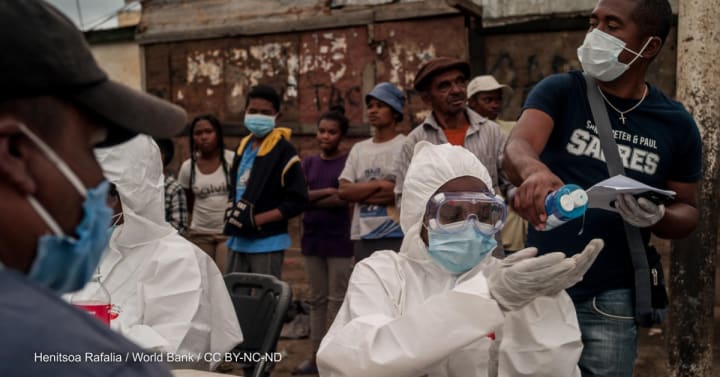
When COVID-19 hit, nobody was ready. And nobody knew what would come next. Two years later, we know that preventing and preparing for the next pandemic is crucial and that we need to act fast. But most of all, we need to take on board lessons learned and avoid replicating the same mistakes.
This month the World Bank’s board is set to approve the recently released white paper for a proposed Financial Intermediary Fund, or FIF, for pandemic prevention, preparedness, and response, or PPPR, in order to have it up and running by the end of the year. The plan was discussed in May at the second global COVID-19 summit, where the United States, the European Commission, and Germany committed nearly a billion dollar toward the planned fund.
The proposal envisions a key role for multilateral development banks based on the logic that these institutions — and especially the World Bank — are the largest source of external financing for PPPR in low- and middle-income countries, and are well suited to steward this financing going forward.
However, several grassroots groups, social movements, and civil society organizations around the world are questioning whether MDBs should have a role in financing PPPR, and if so under what conditions.
We need an independent audit of MDB spending during COVID-19, and what impact it had on the ground before they are given a role in the recovery of future pandemics.
—“Missing Receipts” — a report highlighting key trends identified by more than 20 organizations documenting COVID-19 relief financed by MDBs in 16 countries — finds that development banks ended up replicating old mistakes and exacerbating structural problems, such as lack of transparency, inequality, and rising debt.
In particular, it shows it is difficult to know how funds were utilized at the national and local level, as the banks and their clients failed to track and communicate this data accurately. MDBs prioritized rapidly disbursing funds, bypassing information disclosure.
In many countries, governments were actively suppressing information about the pandemic and using lockdown restrictions as a pretext to curtail freedom of the press and civic watchdog groups. This created the perfect conditions for malfeasance and corruption, which were exacerbated by the lack of transparency from MDBs and their failure to include effective monitoring mechanisms to ensure compliance with basic social and environmental safeguards.
Many MDBs vigorously promoted the private sector first paradigm during the pandemic, focusing on leveraging private investment over supporting countries in rebuilding state capacity to provide essential health, education, and other services. Notably, overall MDB support for social protection was only a fraction of the total support they provided.
In many cases, the social protection measures MDBs funded were designed without sufficient attention to ensuring universality and accessibility, leaving out marginalized groups and those most susceptible to the effects of the crisis, including informal workers, women, refugees and migrants, people with disabilities, and Indigenous people. Meanwhile, even when MDBs gave money to governments, in many cases that money was then passed on to the private sector.
The proposed FIF favoring MDBs — and hosted in the World Bank — risks replicating mistakes from the past and leaving the most vulnerable groups behind. We need an independent audit of MDB spending during COVID-19, and what impact it had on the ground before they are given a role in the recovery of future pandemics.
However, given the World Bank’s consultations for the FIF lasted only two weeks and the fund will likely be approved in June, many are concerned the consultation was rushed, cementing the World Bank’s role — and the role of other MDBs — as a fait accompli.
The international community needs to have a critical reflection on what more effective and inclusive crisis response could look like. PPPR funds must be spent in a democratic and accountable manner, and embrace a human rights-based approach.
If we are serious about preventing the next pandemic, we have to account for social determinants of health and address the root causes of the worst impacts of pandemics including poverty, inequality, environmental degradation, climate change, and corporate capture.
We need to guarantee the right to health, food, sanitation, social security, and an adequate standard of living by supporting universal social protection systems and avoiding their privatization.
We can support governments to fund this at least in part by addressing illicit financial flows and corporate tax-dodging. And to ensure that these advances are not lost in the next crisis, there has to be a sovereign debt work out mechanism for indebted countries.
We need creative solutions that are developed from the ground up and accountable to communities and civil society, especially those who will most bear the effects of these crises. Putting PPPR financing in the hands of MDBs with top-down prescriptions — and poor records of ensuring participation and accountability — may seem like the simplest thing to do, but history shows it may not be the solution we need.






